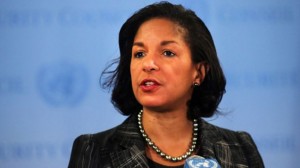 WASHINGTON – The White House began consulting Israeli officials in Washington last week on terms of a comprehensive solution to Iran’s nuclear program that Israel would find acceptable.
WASHINGTON – The White House began consulting Israeli officials in Washington last week on terms of a comprehensive solution to Iran’s nuclear program that Israel would find acceptable.
US President Barack Obama’s national security adviser, Susan Rice, along with Deputy National Security Adviser Tony Blinken and their colleagues at the US departments of state and treasury, held a series of meetings on Thursday and Friday with Israeli National Security Adviser Yossi Cohen and his team.
The meetings come after Obama and Prime Minister Binyamin Netanyahu agreed last week over the phone to “begin consultations immediately” regarding international efforts to negotiate a comprehensive solution with Iran.
An interim deal forged in Geneva last month between Iran and the P5+1 – the US, United Kingdom, France, Russia, China and Germany – settled on a six-month freeze to the crisis, as the parties attempt to negotiate a final-status solution to the nuclear impasse.
Rice and her counterparts discussed the P5+1’s “efforts to pursue a lasting and comprehensive settlement that would resolve the international community’s concerns regarding Iran’s nuclear program,” the White House said in a statement. “During the meetings, the US team reaffirmed President Obama’s goal of preventing Iran from obtaining a nuclear weapon.”
Technical discussions were held in Vienna last week to discuss the implementation of the short-term deal, which freezes Iran’s uranium enrichment and its construction of a heavy-water plutonium reactor in Arak in exchange for modest sanctions relief.
Existing sanctions enforced by the West continue to contract Iran’s economy.
En route to Vietnam on Sunday, US Secretary of State John Kerry had to reassure Iranian Foreign Minister Mohammad Javad Zarif over the phone that the US was sticking to its end of the deal.
The US blacklisted 19 firms on Thursday that were in violation of existing US sanctions, the government says, prompting Zarif to question whether the US was undermining the “spirit” of the agreement forged in November.
“They discussed the importance of moving forward on implementation of the Joint Plan of Action they agreed to in Geneva and of maintaining a constructive atmosphere as the negotiations continue,” the State Department said in a statement. “The conversation was focused on the way forward.”
Since initial warnings from the Iranian foreign ministry that the new designations threatened the diplomatic process, Zarif has quoted Mark Twain speaking of the negotiations: “The news of their demise,” he said, “is greatly exaggerated.”
“We have various views in Iran. Some of them have been very frankly and vehemently expressed by the opponents of the agreement, to the extent that some have asked for my removal,” Zarif said. “I believe that’s only natural in a democratic society where you have different forces, different political views and different branches of government operating to check and balance the exertion of political power.”
Zarif added, however, that “if statements are made that run counter to the very aim of the negotiations, coming from within the administration, then that becomes extremely counterproductive.
So we needed to bring that to the attention of our negotiating partners in very strong terms. And we believe we did.”
By The Jerusalem Post
The Iran Project is not responsible for the content of quoted articles.

 QR code
QR code